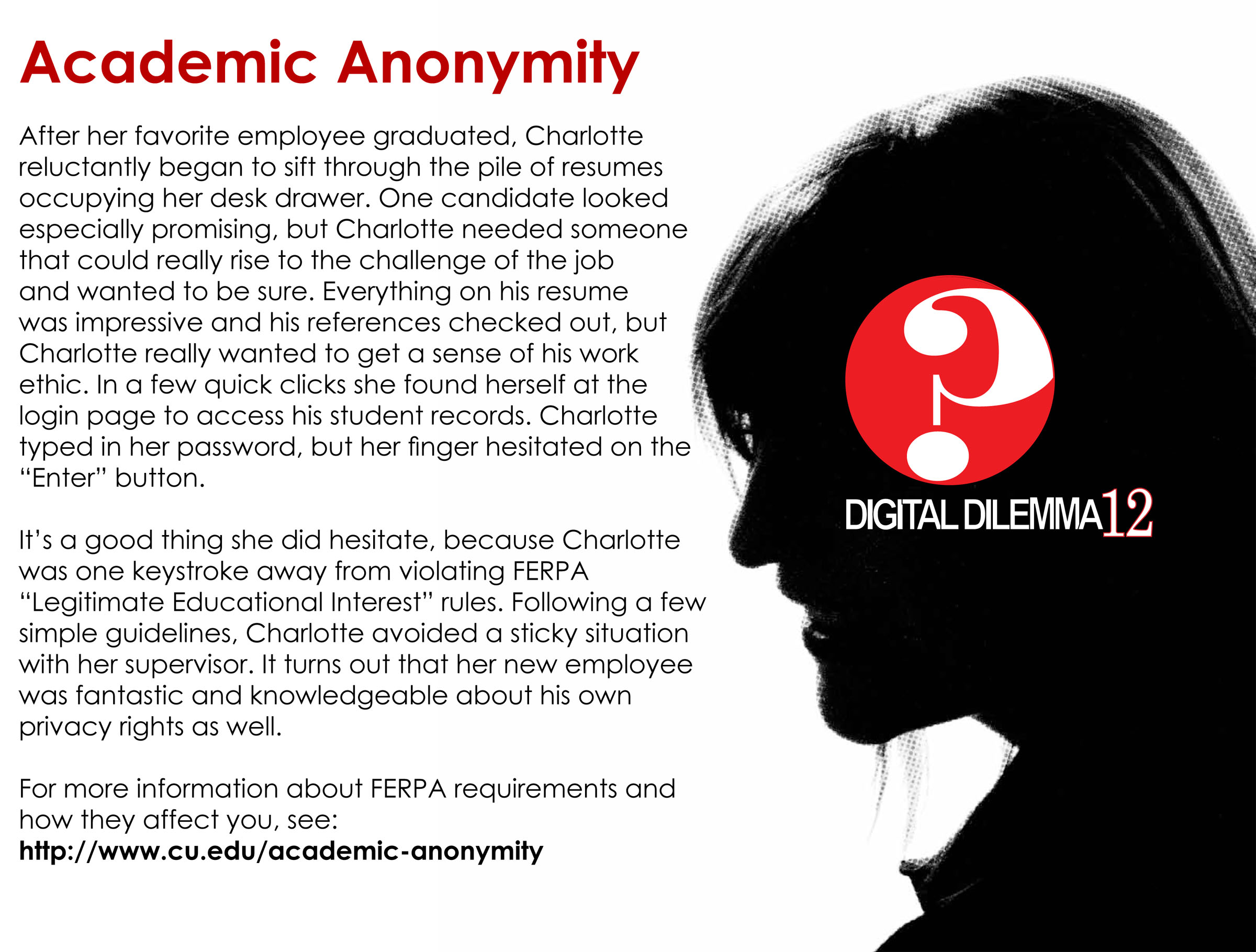
Use Caution, Ensure Compliance (FERPA)
What is FERPA?
The Family Educational Rights and Privacy Act of 1974 (FERPA) is a federal law that protects the privacy of student education records. Higher education institutions that do not comply with this law risk the loss of federal funding and may face litigation. Business processes and systems are designed to protect not only student privacy, but also faculty and staff through training, role-level security and appropriate referral information and resources.
FERPA affords students the right to inspect and review their own education records, the right to request amendment of their records and the right to have some control over the disclosure of their records. Education records are those records that are directly related to a student and maintained by an institution or a party acting for the institution. FERPA defines two types of education records:
- Directory Information – Information that is generally considered to not be harmful or an invasion of privacy if released, such as name, major, year in school.
- Non-Directory (Private) Information – Personally identifiable information that is considered private or sensitive and that may not be shared without expressed written consent of a student or without a legitimate educational interest.
Students may authorize disclosure of non-directory education records to parents or other third parties by providing written permission to the university. They also may restrict the release of directory information (typically considered to be non-sensitive) to those without a legitimate educational interest.
For more information regarding FERPA, watch this video or visit the U.S. Department of Education.
Legitimate Educational Interest
The university discloses information from a student's educational records only with the student's written consent, except to university officials with a legitimate educational interest in the records.
University officials are faculty, administration, student employees, clerical and professional employees, and other persons who manage student records information. This may include certified contractors, consultants, volunteers and other outside providers used by the University of Colorado. The university may forward educational records to other educational institutions when a student seeks to enroll or is enrolled.
A university official has a legitimate educational interest if the official is performing a task specific to his/her position description (or by a contract agreement) related to a student's education or to the discipline of a student, or if the official is providing services for the student or the student's family, such as health care, counseling, job placement, or financial aid – as long as that action is specific to the university official’s role.
Additionally, FERPA allows the university to disclose a student’s educational records without the student's consent under the following circumstances:
- To officials of another school in which the student seeks enrollment.
- To officials of the U.S. Department of Education, the Comptroller General, and state and local educational authorities, in connection with certain state or federally supported education programs.
- In connection with the student's request for financial aid (to determine the student's eligibility or the amount/conditions of aid, or to enforce terms or conditions of the aid).
- If disclosure is required by a state law adopted before FERPA (November 19, 1974), which therefore supersedes FERPA.
- To organizations conducting certain studies on behalf of the university.
- To accrediting organizations to carry out their functions.
- To parents who claim the student as a dependent for income tax purposes.
- To a parent, partner or individual holding Power of Attorney that authorizes access to education records.
- To comply with a judicial order or lawfully issued subpoena. The university makes a reasonable effort to notify the student of the order or subpoena in advance of compliance.
- To appropriate parties in a health or safety emergency.
Tips for Faculty & Staff
- Do not access student records for any reason not directly related to your role or to the task at hand for the purpose of the education or discipline of a student. For example, an advisor accessing an advisee’s course history has a legitimate educational interest. However, an advisor accessing a student’s grades for the purpose of making a hiring decision must receive student consent to access those same records.
- Do your best to answer parent questions without making note of student name or ID for purposes of accessing the student’s record. Many concerns and questions can be addressed through a discussion of university policy, procedures, services and resources.
- When in doubt about legitimate educational interest or who is considered a school official, contact the Office of the Registrar for clarification.
FERPA Resources:
University of Colorado Boulder - https://www.colorado.edu/registrar/students/records/ferpa
University of Colorado Denver - http://www.ucdenver.edu/student-services/resources/registrar/students/policies/Pages/StudentPrivacy.aspx
University of Colorado Colorado Springs - http://www.uccs.edu/ir/help/ferpa.html
Family Compliance Office (U.S. Department of Education) - https://www2.ed.gov/policy/gen/guid/fpco/ferpa/index.html?src=rn
University of Colorado APS 2007: Access to Student Education Records - /ope/aps/2007
For assistance with any of the items listed below please contact your campus help desk listed below:
 |
 |
 |
 |
| UCCS Help Desk | CU Denver & Anschutz Help Desk | CU Boulder Help Desk | CU Information Systems Help Desk |
|
719.225.3536 |
303.724.4357 |
303.735.4357 |
303.860.4357 |




